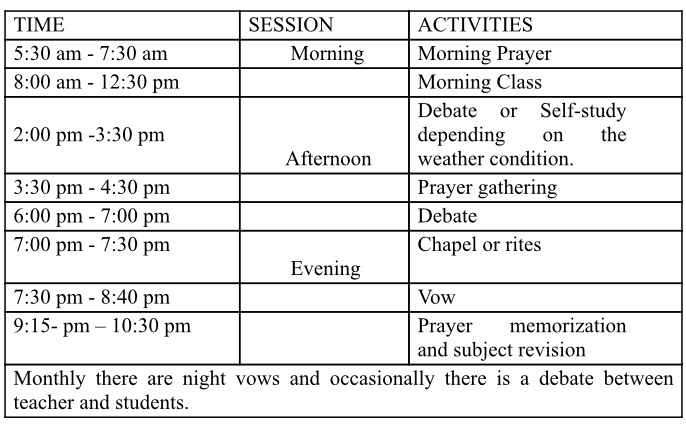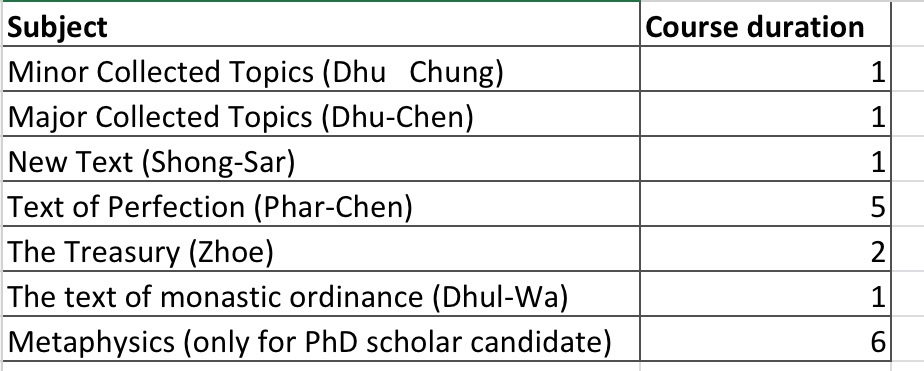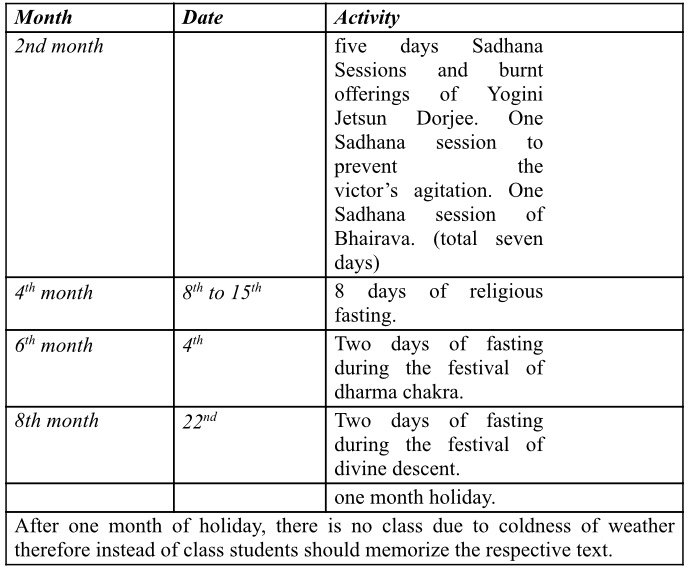DAILY ACTIVITIES.
1. The period of 24 hours learning activities:

2. About Subjects:
The main subjects were based on the Jetsun Choekyi Gyaltsen’s collected works commentary on the roots five fundamental texts, Tibetan grammar, poem & synonyms, Tibet history of politics and dharma, English and Computer Programming.
(Since last year, elite students with high grades in English are selected for the translation programme and given rigorous training on translation of Buddhist texts.)
Currently, there are 137 students attending the 7 different sections of the class.

3. About Teachers:
Total we have 8 teachers in their respective subjects:
Geshe-Lharampa (Monk, PhD in Buddhism) 3
Geshe-Ma (Nun, PhD in Buddhism) 1
Modern science and culture teacher 2
Language teacher 2
Total. 8
4. About Examination:
In total there are 4 different examinations:
a. Dialect examination 2 times per annum.
b. Written examination 2 times per annum.
c. Epistemology and logic examination during the annual jan-kunchoemeeting.
NOTE: (Elite students of the respective class are selected for inter-monastics debate programme after mid-term examination thus programme is known as jan-kunchoe. To enter this programme is a prestigious honor for a student.)
d. Annual recitation examination.
Students who scored distinctive results are being awarded as per school accreditation programme.
5. About the awarding of Degree:
Among the five fundamental texts of Tibetan Buddhism, those who pass the “Text of Perfection” are awarded with licentiate degree holder of Bachelor in Tibetan Buddhism and those who pass the “Text of Madhyamaka” are also awarded licentiate degree holder of bachelor in Tibetan Buddhism. Starting from ” The text of Collected topics on prime of cognition ” (Dhu-Dra) till the noble doctrine of Vinaya text (Dhul-Wa) those who passed all of the examinations during the span of 17 years of learning are awarded with the degree of master in Buddhism. Those who studied and passed in that examination; Tibetan grammar, poem and synonyms, Tibet history of politics and dharma are awarded degree of bachelor in the Tibetan language. In total four different degrees are awarded respectively based on their merits and course completion.
6. About Geshe-Ma:
Among two graduated Geshe-ma, one is teaching in our nunnery. This year we had 3 Geshe-ma candidates in 4th class, 1 Geshe-ma candidate in 3rd class, 4 Geshe-ma candidates in 2nd class and in next year (2020) 9 students will be promoted in Geshe-ma scholar class.
7. Nuns Participation in Jan-Kunchoe Meeting:
Since we fled from Tibet, there have been so many hardships in exile life, yet nuns never stoppedthe learning of sacred text of Tibetan Buddhism and its Practice. Under the blessing of His Holiness the Dalai Lama, nuns annual meeting of Jan-Kunchoe continued in India. Gaden-Choeling nunnery never failed to take part in Jan-Kunchoeso far. Every year the number of participants among the students in Jan-Kunchoe keeps on increasing; therefore in 2018 there were 60 students and 2 teachers participated and in 2019 there are also 60 students and 2 teachers participating.
8. Conferences& Workshops on Modern Science:
His Holiness the 14th Dalai Lama used to advise “To be 21st century Buddhist, we must gain faith in Buddhism through modern education and thorough studying of Nalanda tradition of Tibetan Buddhism equally.”Therefore, the distinctive and elite students are regularly participating and attending the workshops and conferences organised by the department of religion and library of Tibet. Moreover, since 2017, two students from our nunnery take part in “Six years Summer Science Class” jointly organised by CTA department of religion, Emory University, Drepung Loselling Monastery and Library of Tibet for the sake of nuns.
9. Introducing of Dharma Doctrine among Foreign People:
Since its inception Gaden-Choeling nunnery had been educating or teaching the doctrine of dharma to foreign students without charging any fees. In 2019 Gaden-Choeling nunnery started implementing the same education policy for nuns as for the foreign students. They are having the same syllabus and examination as regular nuns and are awarded the same degree based on their course duration and successful completion of all the examinations. This year we have 5 foreign students taking part in the regular academic session and 4 candidates entering into regular class, in total we have 9 foreign students so far.
10. Annual Curriculum:
Based on Tibetan Calendar
